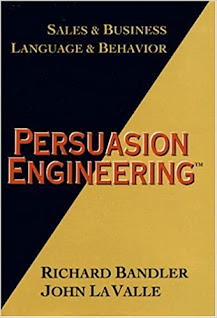Rapport Comes Before Influence
Friday
People understand words at the same rate that they speak them.
Have you ever thought of that? So one of the things you can do when you're in a conversation with someone about Islam is pay attention to the speed at which they talk, and make sure you talk at the same speed. This is their speed, and you will have the greatest chance of reaching them if you speak at their speed.
To go to a little more sophisticated level of gaining rapport, check this out, paraphrased from the same book:
One of the most important "rapport skills" you can learn is to listen to their intonation patterns and listen to the predicates they use. Do they use a lot of picture words or a lot of feeling words or a lot of hearing words? The whole sentence counts.
For example, "Well, it looks like a good opportunity but I feel I'm not ready for it."
This sentence tells you something about the sequence of how information is processed by this person. First they look (visual) and then they check their feelings (kinesthetic). There is no right or wrong in this. There is no good or bad. People process information in many different ways. Listen to the intonation. Listen to the sequence of their predicates. They will indicate how you should talk to them to have the best chance of getting through. Read more about that here.
Sometimes people use nothing but visual words. They'll say "I'm looking for a new stereo. I could see how it would help us have great evenings together." With this kind of person, it almost doesn't matter what the stereo sounds like. If you want to sell him a stereo, you're going to have to show him.
If someone is visually oriented, you will more successfully reach them if you speak in a way that is visually oriented too. Or sound-oriented, or feeling-oriented. Whatever they are.
Speak at the rate they speak. Speak with the same kinds of intonations. And speak to their primary sensory system. Do these things and your ability to get your message to penetrate will greatly improve.
Learn more about speaking to their sensory system.
Citizen Warrior is the author of the book, Getting Through: How to Talk to Non-Muslims About the Disturbing Nature of Islam and also writes for Inquiry Into Islam, History is Fascinating, and Foundation for Coexistence. Subscribe to Citizen Warrior updates here. You can send an email to CW here. Read more...


